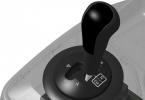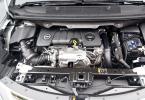Our company is engaged in the sale of filters for passenger cars DIFA brand in wide range... Here you will even find filter elements that are considered very rare. Select the make and model of your car, and also consider the type of engine. Based on this data, find the desired filter option in our catalog.
No vehicle can be successfully operated for a long time without filter elements. Systematic cleansing is necessary engine oil, fuel system and air entering both the engine and the passenger compartment vehicle... Passenger car filters are installed to clean engine oil and need to be replaced periodically. If you do not do this in time, the filter becomes clogged, which will certainly lead to failure of the engine and the entire fuel system.
Filters for passenger cars DIFA: an excellent combination of price and quality

Our company sells filters of DIFA OJSC. Each batch of filters and filter elements in mandatory passes tests to determine their compliance with GOST and international standards.
If you still doubt whether it is worth buying filters for cars from our company, we will give you several arguments:
- The purchase of DIFA filters is a measure of reliable protection of all systems of your vehicle. All products are accompanied by certificates of quality and compliance with standards.
- The prices for our car filters are below the market average in Russia, Belarus and the CIS countries.
- We sell a wide range of products and can offer you even the rarest filters and filter elements.
- Almost every day our catalogs are replenished with new articles of goods. We are improving the production of filters, constantly introducing into it innovative technologies and applying the latest developments.
Varieties of filters for cars
Sailor116rus
"What is a seminar? This marketing campaign... Where information in the "correct", clearly dosed, well-smeared form on the ears is conveyed to a potential wholesale buyer. More full information presented in all angles can be obtained from the Internet. In this case, you can analyze the information received and draw conclusions for yourself. At the seminars, conclusions will hang on your ears. "
This information must be properly filtered - there are a lot of examples
"It is much easier to learn about quality by analyzing real tests journalists or other authorities. "
do you really believe they are real?
"Such seminars are usually organized for the participants free of charge. But someone still pays for the organization and wants to get a return on it, by powdering their brains. And the cost of such seminars is already included in the cost of production."
You yourself contradict yourself about the "reality of tests" and who and how conducts them and, most importantly, at whose expense.
Yes, in general, I agree that almost all filters are made from the same paper - although not even so - but from paper made by the same manufacturers - just let's not forget that these manufacturers cannot and they do not need to produce this paper is allowed in Holland. These same paper manufacturers order production in different parts of the world and here the most interesting thing begins - these corners work in different ways - for some, the quality of finished products is at their best, while for others, how it goes.
This was about paper, but about the production of the filters themselves, it is still much simpler here.
There are several factories around the world (china, turkey, india, mexico, brazil) that operate on a custom-made basis, i.e. a representative of the wag came to this factory - I need 10,000 filters of this name - they were quickly made to him, they were quickly packed in boxes from the "wag" and on the way - other manufacturers come next - therefore, very often in brands-packers (JP Group, Japan Parts, etc. etc.) can be found in the boxes "filters with the original marking of auto concerns"
Now, to these factories of the "first" echelon - there are a lot of clones, mainly in China, Turkey, India - which also have a little less trace of quality and offer cheaper components to customers. Hence the mass of the most diverse brands on our market - all these SCT, ALko, lynx and others that are supposedly of fucking quality and "made in Germany". I could voice the customers of these brands - but it will not be entirely ethical - I will say briefly that these are large Russian companies that distribute spare parts. The only question is how much they want to earn - after all, the filter can be made for $ 1 or you can make it for $ 2.5 and sell them for $ 5
I personally don't seem to be amused by the filter, there I understand everything, the same Mann orders them from China and does not bathe - honestly and openly writes on the packaging in which country of the world this or that filter is made, I am more afraid of the situation with the suspension - for example, the last stub racks I brought them by lemferder - they are Made Ying Taiwan and the quality looks like there is no quality at all - that's what worries me more - since, to be honest, over the years of work in the wholesaler, I'm used to selling quality things from famous brands - it's somehow more interesting to sell, but now all the trends to trade frank shit, but more often))))
After at least every 10 thousand kilometers traveled, the driver who takes care of his car changes the air filter. Thus, we can conclude that this is a product, the demand for which will always be. The production technology is simple, and the equipment for the production of filters for cars is relatively inexpensive, which attracts entrepreneurs who want to master this line of business.
Air filter functions
The main task of an automobile air filter is to clean the air entering the engine. Nice detail subject to her timely replacement traps up to 99% of "foreign" particles in the air. A quality product does not lose its properties throughout its entire service life. In addition to directly filtering the air, it also dampens noise and regulates the temperature. Thanks to the air filter, the risks of various damage are significantly reduced car engine and also minimizes wear on parts.
Types of air filters for cars
Production possible air filters for cars made of paper, and they can also be inertial oil or coal. The form can also be different. The equipment for the production of filters for cars uses a special raw material - cellulose fiber paper. It is protected by a special impregnation, thanks to which it is not afraid of the effects of water, oil or fuel. Paper products cope better with their direct task, therefore they are somewhat more expensive than coal ones. The filtering ability is further enhanced by the fact that the paper is folded into an accordion.
Various designs of air filters
The following types of paper filters are distinguished by shape:
- cylindrical;
- panel;
- frameless.
Cylinder air filters are mainly used in cars with carburetor-type engines. In modern passenger cars, panel type products are mainly used. This design is optimal, since with its small volume the filter has a large filtration area.

How to make filters for cars
The production technology of air filters is quite simple. It consists in the fact that a special rotating drum feeds the paper between two rotating cylinders, which bend it, making an accordion. The counter counts the same number of folds. After that, the paper is directed along a conveyor belt to the circular saw, which makes a cut at regular intervals.
The top and bottom of the filter are manufactured using liquid wax coated aluminum molds and liquid polyurethane. All operations with molds, namely waxing, pouring with polyurethane, subsequent transfer of the finished product to the cooling grid, are performed by a manipulator.
Equipment for the production of filters for cars represents almost completely automated line, which can only be serviced by one employee. Its tasks include placing corrugated paper blanks on the bottom of the filter, removing finished products from the chute, into which they fall after the manipulator finishes its work. The packaging of finished products is also carried out by the line operator. Thus, the complete the production cycle takes approximately 20 minutes.

You can collect a line from component parts... However, by purchasing ready-made, assembled and configured equipment, you can minimize labor costs, maximize work productivity, and also protect yourself from problems with the maintenance and repair of devices.
The capacity of the automotive filter market is huge, about $ 300 million, since various filters there are many in the car - from eight and more. The car filter market is responding to changes in the vehicle fleet as a whole, and the collapse in new car sales does not affect it too much. Therefore, the situation on the automotive filter market can be called stable, or rather, inactive.
V modern cars installed air, oil, fuel, cabin filters, filters blow-by gases since the introduction of Euro-4, filters for cleaning oil in automatic transmissions, additional filters can be installed for fine cleaning diesel fuel heated, pre-filtration systems for diesel fuel, filter adsorbers to remove moisture from pneumatic brake system in trucks, filters for cleaning antifreeze and others. The largest market share is occupied by oil filters and air, with the growing segment being cabin filters.
Oil filters
Automotive market oil filters in the RF annually increases by 1% –2%. In Russia, the oil filter change interval is approximately equal to the mileage of a passenger car per year, therefore, the volume of the oil filter market in quantitative terms is slightly larger than the passenger car fleet.
Products of key global manufacturers such as Mann and Knecht are presented on the Russian market, Russian companies, packing companies, and a large number of counterfeit products, since it is possible to organize the production of filters in semi-handicraft conditions. Filters differ in cost, which is determined by both the brand and real quality indicators.

The structure of the oil filter market can be considered fully established. On the secondary market among passenger cars domestic brands dominated by TM "Livny", "Difa", "Kostroma filter". Filters TM Finwhale, Mann, Fleetguard are leading in the segment of passenger cars of foreign brands.
Primary market needs Russian brands is provided mainly by JSC Avtoagregat. On the market trucks dominated by TM "Livny", "Difa", "Kostroma filter".
Due to the fact that the oil filter market is stable and formed, it is characterized by an average level of competition, more intense in the segments of foreign cars during periods of growth in the car market. The struggle takes place between manufacturers and packers and between manufacturers of legal products and counterfeit products, but in times of crisis, the segments of legal, branded products and packers of quality filters grow more slowly than counterfeit products.
This is facilitated by the fact that outwardly quality filters may not differ from direct fakes, since in the manufacture of filter elements they use easily externally reproducible materials, most often this special types filter papers, as well as various multilayer non-woven filtering synthetic materials.
Concerning further development, then in Russia in the foreseeable future changes in the situation in the car market are not expected, respectively, and the market in question will remain approximately the same as now with the strengthening of the positions of cheaper, off-brand products.
Technological progress in the production of oil filters takes place in the direction of enlarging and complicating the design of filtering devices for a car, supplies to secondary market replaceable filter elements that are easy to dispose of after the end of their service life, the development of frameless highly specialized filter elements.
Air filters
The volume of the air filter market in the Russian Federation is about 50 million units. The market is divided between manufacturers of world famous brands from the EU and the USA, Asian manufacturers and domestic enterprises.
There are more than twenty well-known TMs of the products in question on the market. Most requested
air filters for cars of new domestic brands - TM Filtron, Fortech, Fram, Goodwill, Mann, Knecht, and
SibTEK, TSN Citron. The segment of Russian foreign cars is dominated by TM Febi Bilstein, Knecht, Mann, Filtron, LYNXAuto, Patron, TSN Citron, Champion. In the segment passenger cars Asian brands are most in demand for air
filters TM Mann, Knecht, Sintec, Nevsky filter and original.

The air filter market can be called formed, the level of competition is average, in more dynamic times it becomes aggravated in the segment of foreign cars, while this segment is dominated by imported brands. Domestic products are in demand in the segment of domestic brands.
The market is also influenced by regional features - outside Moscow and St. Petersburg, car owners are more loyal to domestic products and off-brand filters for domestic cars, which make up the majority of the regional vehicle fleet. Imported branded filters can be several times more expensive than domestic products, which determines the choice of the car owner.
The market is generally characterized by a large number of off-brand products, vigorous activity of packaging companies, resale of Chinese and Turkish products. of different quality, a large amount of counterfeit. This feature is determined by the fact that large investments and complex equipment are not needed to organize the production of air filters, especially for the resale of products of unknown brands.
The dynamics of the development of the automotive air filter market is determined by changes in the vehicle fleet as a whole - sales of both new and used cars. Therefore, if sales of new cars fall, then the volume of the air purification systems market changes little. But the quality of the market is deteriorating.
One of the key trends in the technological development of air filters is the pursuit of maximum compactness. In particular, this is why round filters are supplanted by panel type air filters, which are distinguished by a more favorable ratio between filtration area and housing volume. Further progress is related to the ability to change the shape of the filter.
For example, the Mann + Hummel concern has already created the Flexline manufacturing technology. Air filter Flexline can be installed in any limited space, since it has a flexible outer contour and can take any shape. In addition, the flexible circuit allows for a larger filtration surface. But this technology, most likely, will not reach the Russian car market soon. Not before the car market gets out of the pit of the crisis.
Cabin filters
Segment cabin filters was one of the fastest growing within the market in question. Rates of growth
accounted for more than 10% annually. Cabin filters have appeared relatively recently, but by now the EU car fleet is equipped with cabin filters by 85%, and the fleet of new cars by 97%, and in the near future there will be a cabin filter in every car.
Accordingly, the number of cabin filters in the Russian car market grew at an accelerated pace. Now sales of new cars in Russia are not growing, and therefore sales of cabin filters have also slowed down.
The market of cabin filters in Russia has not yet had time to form, car owners, for the most part, do not consider it necessary to install these devices in a car, and now they also save on non-essential auto components.

Nevertheless, there are already major players in this market, the shares of which can be roughly determined. These include
Mann + Hummel, which occupies about 20% of the branded products segment, Sogefi, which occupies about 5% of the segment, and Bosch, with a share of about 2-3%. At the same time, the share of cabin filters made in China, Korea and other Asian countries is increasing. Russian enterprises also supply cabin filters to the market, in particular, Concern Citron LLC.
For obvious reasons, the high growth rate of the cabin filter market will not recover in the short term. But the car fleet of the Russian Federation, as before, continues to change towards an increase in the share of foreign cars and cabin filters will be in demand, since they are built into the car at the assembly plant and need to be regularly replaced. At the same time, the share of off-brand products will grow faster, since they are cheaper.
Market participants note that the purpose of cabin filters is still not clear to many car owners in Russia. Especially the need for them regular replacement... This hinders the development of the market no less than the general decline in purchasing power.
The technology for making cabin filters is not changing too dynamically and no special changes are expected here.
Cabin filters are mainly made of corrugated paper and the cleaning quality is sufficient for domestic car owners. Some companies import to the Russian Federation cabin filters made of nonwoven materials, which provide more thorough screening of dust and soot particles.
Still rare are carbon cabin filters, which are made from paper with activated carbon particles that can remove dust and traffic fumes except formaldehyde or CO2. But for Russian market they are too expensive. Rarely are electret filters, which have an electret layer of a large number of charged fibers, retaining the smallest particles of contamination.
Almost unknown in the Russian Federation carbon filters having an electret layer and a layer with antiseptic impregnation. All these, modern species cabin filters are still waiting in the wings on the Russian car market. On the other hand, the deceleration of the car market, possibly at the same time, is the key to future rapid growth.



